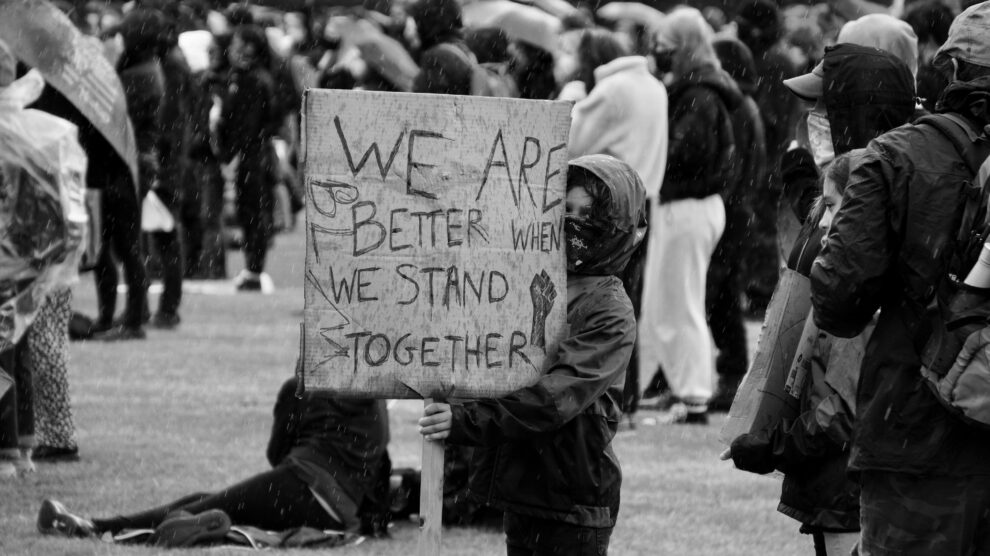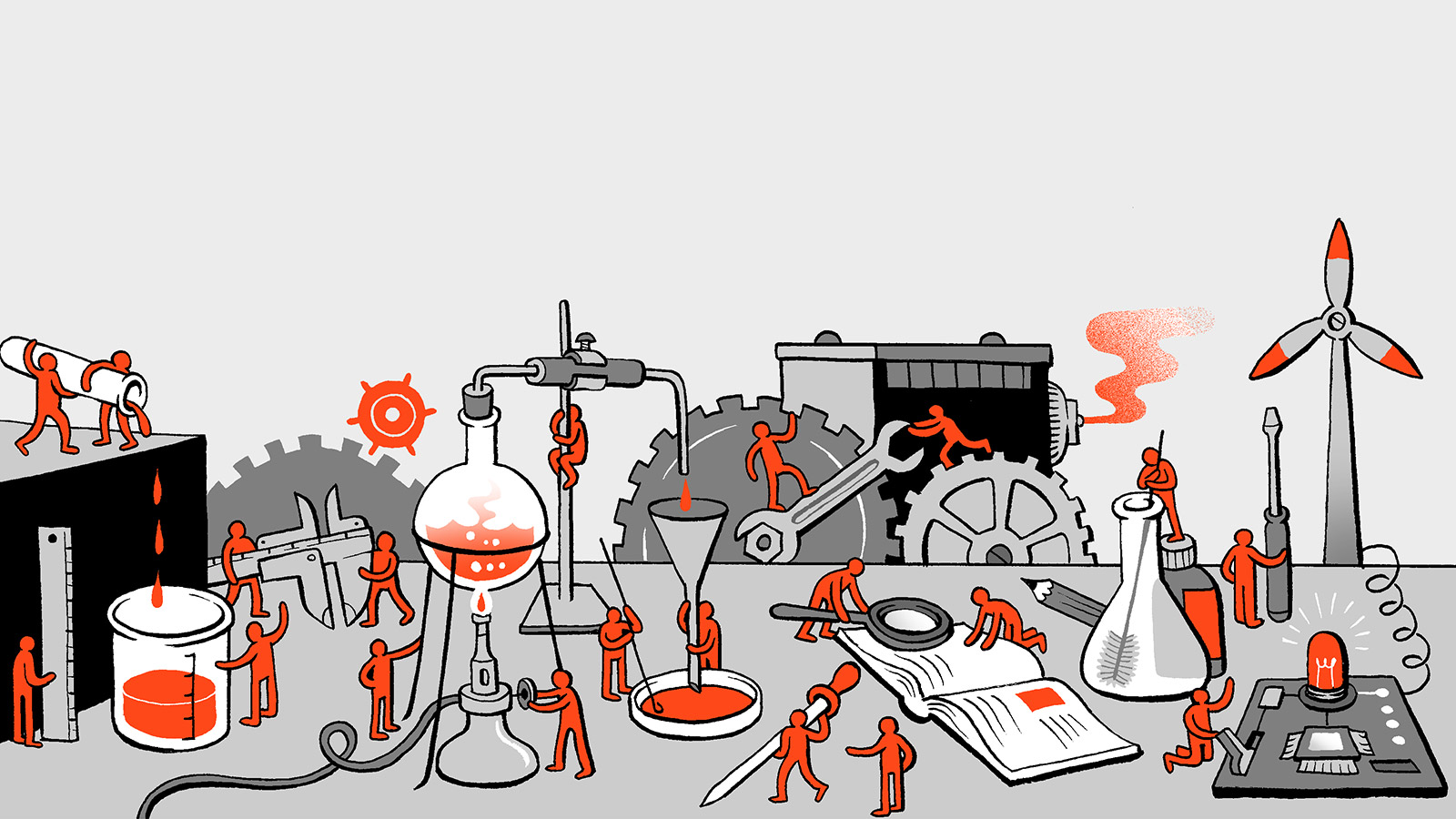Chapter and Working Group Reports, Summer 2020: Climate Change
Climate reports from our Climate Change Working Group and chapters in Albany • Ann Arbor • Atlanta • Bay Area • Boston • East TN • Madison • Twin Cities
Volume 23, number 2, A People’s Green New Deal
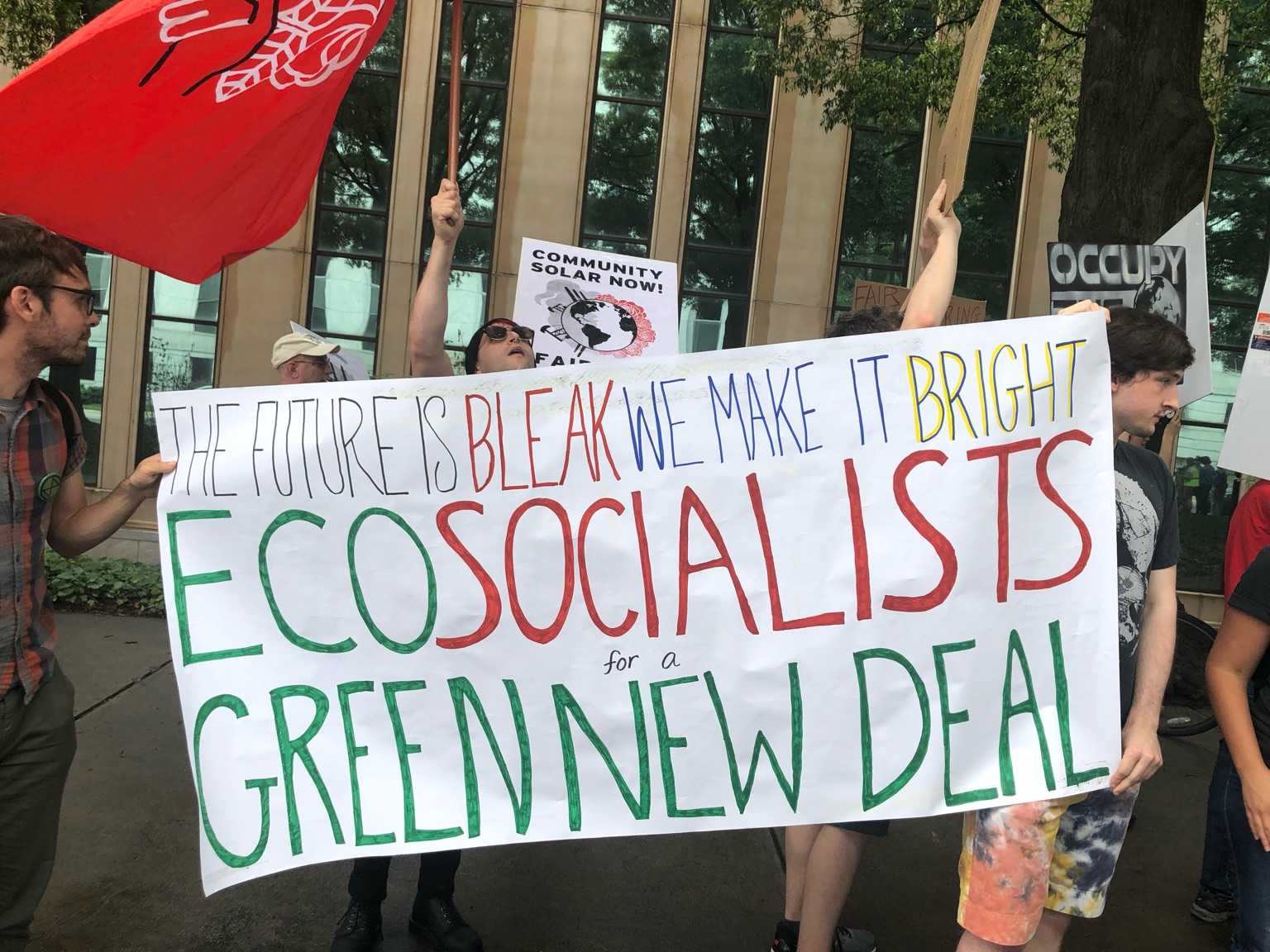
Read more chapter reports in this issue from Philadelphia, Western Mass., and the Translation Collective
Climate Change Working Group
By David Hofmann and Rebecca Orrison
The Climate Change Working Group was founded shortly after Science for the People’s constitutional conference in Ann Arbor in February 2018 with the mission of organizing in response to the rapidly exacerbating climate crisis.
We launched the People’s Green New Deal campaign to strengthen the Green New Deal proposal through more inclusive grassroots engagement while also coalescing support around radical demands. To kickstart our campaign, we published an open letter on our website with more than two hundred signatories, predominantly from the academic sphere.
Alongside the working group’s national-level organizing, we prioritize a locally engaged grassroots strategy through a coalition of SftP chapters and in solidarity with many other partners across the country. The rich variety of organizing from each of these local chapters, which covers topics ranging from decolonization and labor rights to fighting fossil fuel infrastructure and educational projects, is grounded in universal principles of social and ecological justice.
[skip to reports from Albany • Ann Arbor • Atlanta • Bay Area • Boston • East TN • Madison • Twin Cities]
We have found that the Climate Change Working Group provides a valuable national platform for synergy and collaboration among our local chapters. One particular example is the exchange of campaign materials between local campaigns.
Importantly, our national organizing efforts also created an ideal basis for the launch of the People’s Green New Deal SftP issue that you are reading right now. We are convinced that this issue will inform our campaign organizing and we look forward to involving old and new members in organizing with Science for the People through the People’s Green New Deal campaign effort. Because we realize more work is necessary to strengthen this campaign, our first priority is recruiting more active organizers to the Climate Change Working Group.
In the following reports, several SftP chapters share a brief overview of their People’s Green New Deal-related organizing. If you are intrigued by all of this, join us today!
Contact:
climatechange-wg@scienceforthepeople.org
scienceforthepeople.org/peoples-green-new-deal/
Albany, NY
By Rebecca Orrison
The Albany SftP chapter has been organizing in support of local actions with the Capital District Democratic Socialists of America (CDDSA) and Extinction Rebellion: Capital Region (XRCR). In coordination with the Rensselaer Polytechnic Institute’s Department of Civil and Environmental Engineering, Albany SftP organized a community panel focused on the intersections of social justice, food systems, and climate change as part of the Engineering the Anthropocene series. The evening consisted of a short panel discussion with experts and small-group discussions. Conversation topics included how class and socio-economic status mediate our engagement with food systems, and how anthropogenic climate change is changing access to food systems. We look forward to continuing to engage with our community.
Contact: sftp.albany@gmail.com
Ann Arbor, MI
By Noah and Sasha
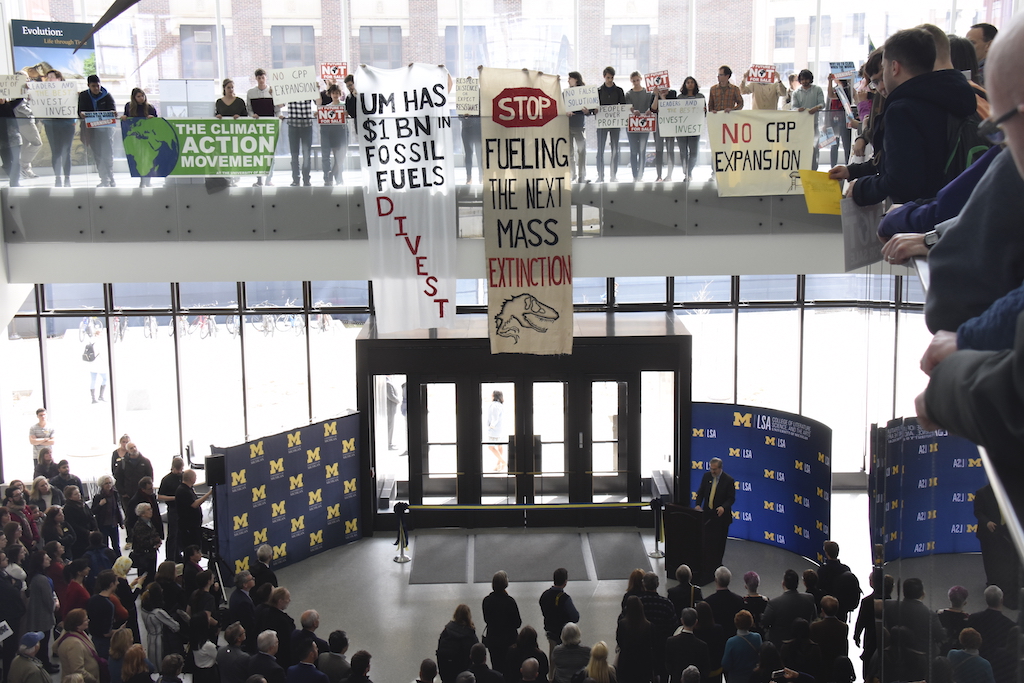
Over the past two years, the Ann Arbor SftP chapter has been involved in researching and exposing the University of Michigan’s complicity in the climate crisis and advocating for the implementation of an ambitious and just climate policy. The University of Michigan is one of the largest public research institutions in the world and has global influence. We seek to hold the institution accountable and force it to act for the common good.
Much of this work has been a combination of educational efforts, countering the university’s misleading public relations with factual information, and building collective power to act on that knowledge. We were heavily involved in planning the Global Climate Strike in Washtenaw County on March 15, 2019, which saw thousands take the streets and led to hundreds participating in an eight-hour sit-in at the university president’s office with a host of demands, at the end of which ten peaceful protestors were arrested (including several Ann Arbor SftP members) for refusing to leave without the president committing to a meeting.1
Subsequent efforts focused on garnering public support by publicizing the university’s choice to arrest rather than engage with students, as well as supporting the arrestees through their nine-month legal battle.
We are researching the University of Michigan’s investments and have revealed that the school holds an estimated $1.5 billion of investments in fossil fuel companies. Work by LittleSis, a grassroots watchdog network, has further shown how some of these investments fund far-right political movements.2 This work has provided ammunition to local activist groups such as the Climate Action Movement and 1University campaigns, which, among other demands, have been fighting for equitable distribution of university funds across University of Michigan campuses and divestment from fossil fuels, as well as just and community-focused investment policies more broadly.
In February 2020, we succeeded in winning a freeze on any new fossil fuel investments while the university Board of Regents reviews the investment policies. Current work on this front involves developing and advocating for an investment process that includes community input.
In parallel, we have advocated for science-based targets and accountability measures for a just transition. One tangible outcome has been to successfully pressure the university to account for methane leakage in its emissions inventory, acknowledging the science that shows that official emission factors for methane are grossly underestimated.
Furthermore, as the graduate student labor union (Graduate Employees’ Organization AFT-MI Local 3550, AFL-CIO) renegotiated its contract with the university this year, Ann Arbor SftP members worked as a support body for growing a labor campaign around bargaining for the common good. We helped to craft a series of ambitious proposals around climate change, housing, food justice, and racial justice that force the university to implement broad and holistic changes to address these interconnected issues. The proposals included investments in climate-friendly affordable housing and a city tenants’ union, demilitarization of the university’s police force, divestment from the fossil fuel industry and prison industrial complex, investments in public transportation, and union representation on decision-making bodies.
While the university initially refused to discuss any of these topics and negotiations were significantly disrupted by the pandemic, we did win a modest concession that sets a powerful precedent for local labor groups bargaining over issues of climate justice. Through this campaign, we built connections with many unions with whom we will work to adapt and incorporate these demands into their own contract negotiations, launching a powerful cross-campus labor campaign that bargains for the common good and fights for a livable world for all.
Contact: sciforthepeople@umich.edu
Atlanta, GA
By David Hofmann
Since early 2018, the Atlanta SftP chapter has centered its activism around environmental and climate justice. Joining the national campaign for a People’s Green New Deal was a natural continuation of our organizing, education work, and action. In May 2019, our educational activities helped us organize a Green New Deal town hall in Gwinnett County. The program covered topics such as energy efficiency, weatherization, renewable energy production, and immigrant rights. From this experience we developed an organizing guide in collaboration with the Ecosocialism Working Group of the Metro Atlanta DSA. This guide was shared through the People’s Green New Deal national platform to facilitate the replication of similar town halls beyond Atlanta. We also organized a Green New Deal book club where we discussed Naomi Klein’s most recent book, On Fire: the Burning Case for a Green New Deal.
Our direct actions included visiting Senator David Perdue’s Atlanta office in March 2019 to confront his staff around Senate Majority Leader Mitch McConnell’s suppression of the introduction of a Green New Deal resolution.3 Then, from June through August 2019, we joined protests and rallies organized by Extinction Rebellion, as well as Sierra Club, to put public pressure on Georgia’s Public Service Commission and the Georgia Power company. Our demands included the expansion of renewable energy production, the closure of all coal-fired power plants, and the end of investments at Plant Vogtle, the only nuclear power plant currently under construction in the United States. These actions led to the closure of five coal-burning units at two power plants and a commitment from Georgia Power to double its intended solar capacity.4 We understand these small victories are not enough to meaningfully reduce Georgia’s carbon footprint and aid communities still affected by toxic coal ashes. We believe that dissolving the corporate monopoly of Georgia Power and its parent, the Southern Company, and replacing it with a publicly-owned energy infrastructure is necessary for meaningful change.
In late summer 2019, as forests were burning in the Amazon region, we followed the call by Indigenous-led groups to join a protest visit to the Brazilian Consulate.5 In September 2019 we supported a mobilization effort leading to the Climate Strike. This effort, led by Extinction Rebellion, drew several hundred people into the streets and generated media attention on the climate crisis and the lack of action by elected officials.6
Contact: sftpatlanta@gmail.com
Bay Area, CA
By Ann Coleman
On December 8, 2019, Bay Area SftP chapter hosted a panel entitled Striking for a People’s Green New Deal at the Sixth Annual Howard Zinn Book Fair in San Francisco, California. Co-hosts included Sunrise Movement Bay Area Hub, Pesticide Action Network North America, and The Red Nation.
This multigenerational panel explored the importance of various topics including Indigenous knowledge and the political role of Indigenous nations, the radical vision of youth in struggle, decades of work by scientists and communities around agroecology, and Indigenous solutions to climate destruction. Conversations covered strategies and frameworks for mass struggle and explored questions around environmental racism and the political, economic, and social potential of a mass movement to repair our land, clean our water, and heal our bodies. The panelists and organizations agreed to future collaboration and organizing efforts.
Boston, MA
By Timothy LaRock, Nafis Hasan, Erik Van Vlack, Mara Freilich
The Boston Area SftP chapter has been working in collaboration with the Take Back The Grid energy democracy campaign, part of the Boston DSA chapter of the Democratic Socialists of America, to democratize, decarbonize, decommodify, and decolonize our system of energy production and distribution. In the past year, our joint venture has focused on political education and community literacy around energy systems, and direct actions against new fossil fuel infrastructure in eastern Massachusetts.
Our literacy programs have included the following:
- a webinar on the role of scientists in the 2019 Global Climate Strike
- a panel on energy democracy and microgrids featuring Jen Stevenson, executive director of Climable, an energy and environmental consulting firm, and Dr. Nathan Phillips, a professor at Boston University
- a town hall discussion on a proposed electric substation in a residential neighborhood that would support massive electricity use by biotech and other industry in the Kendall Square neighborhood of Cambridge
- a seminar about the role of design in the Green New Deal with speaker William Fleming, a landscape architect and director of the McHarg Center, part of the Weitzman School of Design at the University of Pennsylvania
- a presentation and discussion with local climate activist Larry Rosenberg about the transformative potential of High Voltage Direct Current Transmission Lines in our existing and future energy grids
In addition to our independent efforts, we have participated in solidarity events with local grassroots environmental justice groups to oppose fossil fuel infrastructure. We continue to support the ongoing opposition, led by the Fore River Residents Against Compressor Station (FRRACS) in their ongoing fight against the natural gas compressor station being built in Weymouth, Massachusetts, by submitting comments to state and federal regulatory agencies and showing up to protests at the construction site.
We are also working alongside residents of East Boston and the local environmental justice group GreenRoots in their struggle against the utility company Eversource, which is trying to build an electric substation in a projected flood zone located near millions of gallons of jet fuel storage and a playground. By perpetuating injustice against immigrant communities and communities of color, the proposed site, which had once been promised for recreation, now faces the threat of becoming yet another piece of fossil fuel infrastructure, the necessity of which is increasingly questionable based on electric supply demands in the area. In support, we have participated in call-in campaigns to regulatory agencies and joined protests organized by local activists.
Contact:
boston.scienceforthepeople.org
takebackthegrid.org
East Tennessee
By Ben Allen
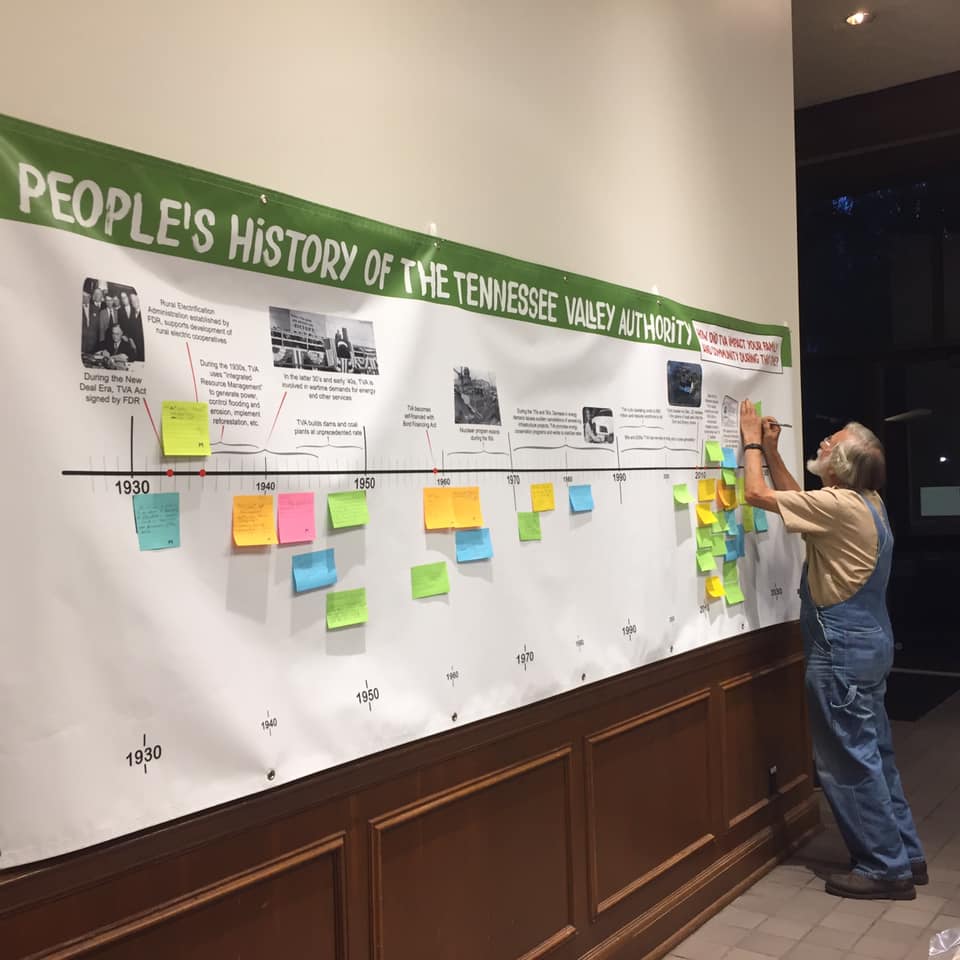
The East Tennessee SftP chapter has been working to win a People’s Green New Deal to transform the Tennessee Valley Authority (TVA), a federally-owned energy and infrastructure conglomerate. Multiple regional organizations including SftP are coalescing into the Tennessee Valley Energy Democracy Movement to fight privatization, stand up for democratically controlled public power, and bring together TVA workers and everyday people to collectively rewrite the TVA Act as part of a Green New Deal.
The Tennessee Valley Energy Democracy Movement stems from the 2019 Energy Democracy Tour, which visited thirteen communities throughout the TVA footprint to rebuild a collective vision for our energy future. As an alternative to the TVA’s current approach, we are developing an energy policy white paper that will serve as a road map to empower local power companies and communities to implement a more democratic energy process throughout the Tennessee Valley, partly by engaging local legislators and possibly presidential candidates . We are also working with groups like the Sunrise Movement to coordinate climate strikes and other direct actions to help shape our climate future.
Contact: sftp.etn@gmail.com
Madison, WI
By Brian Ward
The People’s Green New Deal Madison has been an active ecosocialist force in Wisconsin’s capital. We have been involved in local struggles, including the fight against upgrading fighter jets at a local air base, which is creating PFAS contamination in the chain of lakes in Madison that could make working class neighborhoods uninhabitable while simultaneously expanding the US war machine.
Opposition to this project has popular support throughout the city including among the Madison Common Council, who voted against the project. Nick Estes, author of Our History is the Future and co-founder of The Red Nation, an Indigenous liberation coalition, spoke to the group about the Red Deal, 7 which emphasizes the importance of centering Indigenous liberation and Indigenous knowledge in the necessary radical reforms to transform our economy. We are incorporating the missions of the Green New Deal and the Red Deal in a local framework to organize people in our community.
Contact: peoplesgreennewdealmadison@gmail.com
Twin Cities, MN
By Twin Cities SftP Chapter
Much of the Twin Cities SftP Chapter’s climate change organizing has focused on the movement to stop the Line 3 Tar Sands Pipeline. This massive pipeline, part of a new route that would carry Alberta tar sands oil to the shores of Lake Superior in Hudson, Wisconsin, would pass through treaty territories of the Anishinaabe people, cross more than two hundred bodies of water, intersect thousands of acres of wetlands, and pass within a half mile of at least seventeen wild rice beds.8 The annual greenhouse gas emissions from this pipeline are expected to exceed those currently emitted by the entire state of Minnesota.9
The struggle against Line 3 is emblematic of similar struggles around the world: intersecting with Indigenous sovereignty, the capture of democratic processes by industry, and a media narrative that insists on narrowly portraying the conflict as “environment vs jobs.”10 Extractive projects like Line 3 are also linked to the epidemic of missing and murdered Indigenous women and relatives (MMIWR), as predominantly male workers brought in to build the pipeline result in increased drug trafficking, sex trafficking and violent crime in and near Indigenous communities.11
We entered this struggle as part of a grassroots formation of individuals, organizations, and affinity groups working to stop the Line 3 Tar Sands Pipeline.12 This movement has put a strong intentional emphasis on centering the leadership and perspective of frontline Indigenous water protectors. In this context, we are finding our way through iterative action and reflection on our roles, responsibilities, and potential as scientists to work for climate justice, while holding ourselves accountable to the material necessity of decolonization.
As many Twin Cities chapter members are positioned within the University of Minnesota, we are seeking to connect movement actions outside the university to efforts inside. We successfully applied for three small university grants and have used them to transfer funds to Indigenous frontline organizers through two university-sponsored events. Through these events, Indigenous organizers shared their ongoing work and perspectives on the Line 3 Tar Sands Pipeline, MMIWR, and climate justice. These organizers affirmed that every one of us has skills and knowledge needed in the struggle.
We have also sought to leverage our scientific training to engage with systems of power that repeatedly fail in their missions to protect the public good. We have formed a working group of scientists who have collectively reviewed project permits for the Line 3 Tar Sands Pipeline, prepared talking points for public use, and submitted written comments and public testimony to regulators over pipeline construction and operation.
Through this work, we have connected with scientists and health professionals outside of our networks. Developing a shared political analysis, in real time, with scientists who may for the first time be encountering the foundational ideas that underlie SftP has been a challenge. But we have found solidarity, friendship, and inspiration in demonstrating acts of professional courage to one another, as we step outside of our socialized professional identities to land more firmly on the side of justice.
Contact: scienceforthepeople.twincities@gmail.com
- Washtenaw County Climate Strike, “President Schlissel: We Demand A Just Transition to True Carbon Neutrality by 2030,” March 15, 2019, https://gdoc.pub/doc/e/2PACX-1vTxkDAcJ3yLIeVDzdt-k1fDOup7bdF1Lo_Kfd5OOczujC7KgOrwMRTlQ7K2IxqfcAogaI9kQZL6LyQj.
- Derek Seidman, “Why is the University of Michigan Financing the Billionaire Oilman Who’s Bankrolling the Texas Far Right?” Eyes on the Ties, February 3, 2020, https://news.littlesis.org/2020/02/03/why-is-the-university-of-michigan-financing-the-billionaire-oilman-whos-bankrolling-the-texas-far-right/.
- Aida Chavez and Ryan Grim, “The Viral Confrontation With Dianne Feinstein Had a Political Impact Most Pundits Missed,” The Intercept, May 1, 2019, https://theintercept.com/2019/03/01/dianne-feinstein-green-new-deal-sunrise-movement/.
- Aida Chavez and Ryan Grim, “The Viral Confrontation With Dianne Feinstein Had a Political Impact Most Pundits Missed,” The Intercept, May 1, 2019, https://theintercept.com/2019/03/01/dianne-feinstein-green-new-deal-sunrise-movement/.
- Gloria Tatum, “The Amazon is on Fire and the Planet is getting Hotter,” Streets of Atlanta, September 9, 2019, https://streetsofatlanta.blog/2019/09/09/the-amazon-is-on-fire-and-the-planet-is-getting-hotter/
- Nedra Rhone, “UPDATE: 19 arrested in climate protests across metro Atlanta,” The Atlanta Journal-Constitution, September 27, 2019, https://www.ajc.com/atlanta-news-metro/ajc/several-arrested-during-climate-protest-buckhead/H12x6ljLjw33nAuj7byh0K/
- Nick Estes, “A Red Deal,” Jacobin, August 6, 2019, https://www.jacobinmag.com/2019/08/red-deal-green-new-deal-ecosocialism-decolonization-indigenous-resistance-environment/
- 8. “Final Environmental Impact Statement: Line 3 Project,” Minnesota Department of Commerce, December 19, 2019, accessed May 8, 2020, https://mn.gov/eera/web/file-list/13765/.
- “Line 3 report: A Giant Step Backward,” MN350, accessed May 8, 2020, https://mn350.org/giant-step-backward/
- “Line 3 & Treaty Rights,” Sierra Club North Star Chapter, accessed May 8, 2020, https://www.sierraclub.org/sites/www.sierraclub.org/files/sce/north-star-chapter/pdf/TreatRightsFactSheet.pdf; Tara Houska, “To the PUC, Native culture matters—but not enough to affect its Line 3 decision-making,” Minnpost, March 29, 2018; https://www.minnpost.com/community-voices/2018/03/puc-native-culture-matters-not-enough-affect-its-line-3-decision-making/; Dan Kraker, “At Line 3 pipeline hearing, it’s environment vs jobs,” MPR News, September 28, 2017, https://www.mprnews.org/story/2017/09/28/enbridge-line-3-opponents-rally-capitol-before-hearing.
- “Minnesota: Water Protectors Confront Enbridge About MMIW, Line 3,” It’s Going Down, February 2, 2019, https://itsgoingdown.org/minnesota-water-protectors-confront-enbridge-about-mmiw-line-3/; Winona LaDuke, “Sex, fossil fuels and matriarchal economics,” The Circle, May 3, 2019, http://thecirclenews.org/environment/sex-fossil-fuels-and-matriarchal-economics/
- For more information on the formation, visit: https://www.stopline3.org


